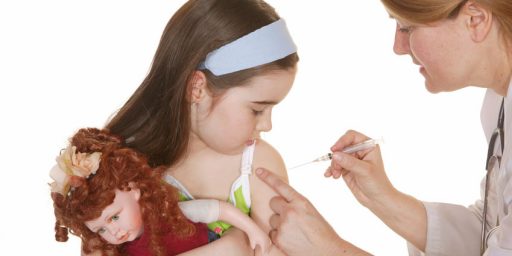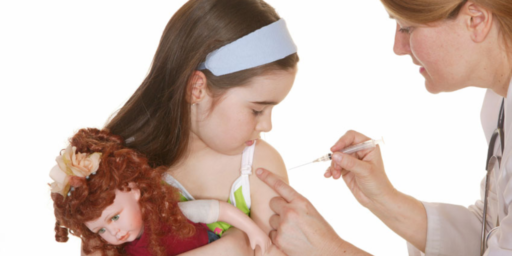Protein Mutations Linked To Autism
Some new research indicates that a possible cause of autism.
Scientists have discovered how mutations in two key proteins may lead to autism.
They have shown one protein increases the excitability of nerve cells, while the other inhibits cell activity.
The University of Texas team found that in normal circumstances the proteins balance each other out.
[…]
The findings back the theory that autism involves an imbalance between excitatory and inhibitory connections between nerve cells.
[…]
The proteins – neuroligin-1 and neuroligin-2 – create a physical bridge at the junction – or synapse – of nerve cells, enabling them to make connections with others.
In studies on rats the researchers showed that raising levels of both proteins in nerve cells led to the creation of extra synapses.
Neuroligin-1 was associated with excitatory connections and neuroligin-2 with inhibitory connections.
When they introduced a mutant form of neuroligin-1 thought to be carried by some people with autism the number of synapses fell dramatically – and the cells became significantly less excitable.
Infants are born with far more synapses than survive to adulthood. Active synapses proliferate during development, but inactive synapses are culled.
The latest research suggests that carrying a mutant form of neuroligin-1 may depress the number of synapses that make it into adulthood.
This could hamper the ability of nerve cells to make the usual connections, and lead to the deficits seen in people with autism.
It affects the way a person communicates and interacts with other people.
In other words, all those studies showing that there is no link between autism and vaccines…well that was probably true, and the actual culprit is the genetics of the parents.





Yeah, as a parent I can understand the need to know why a child has autism or any other illness and what caused it. It’s a shame though that this is being dragged through the courts when doctors and scientists have said for some time there is no link to vaccines.
I’ll buy this as a cause of autism. I’m skeptical of it being the cause of autism.
Two reasons:
First, autism is pretty clearly a spectrum of similar disorders, rather than a single disorder. This suggests a variety of mechanisms interfering with closely related brain functions.
Second, the mechanism described here seems not selective enough to explain high-functioning autistics. An overall failure of synapse development sounds awfully pervasive, enough that I’d expect overall decrease in brain function, not just the social skills that are inhibited in autistics. Now, it’s the case that many autistics are also mentally retarded, and this mechanism could explain this subset of cases. But not all cases.
Oh, and I’m thoroughly convinced that vaccines are not among the mechanisms behind autism.
The fact that these 2 protein mutations may lead to autism, doesn’t exclude the possibility that these protein mutations may have been caused by something other than genetics.
-doctors and scientists have said for some time there is no link to vaccines- markm
Many years ago doctors and scientists claimed bad parenting was the cause of autism. Shows you that doctors and scientists are not always right and 100% of them never agree.
Kent: Your comment suggests that gene switches are simply binary, i.e. on/off. Some may be, some may not. The extent of cells affected by a damaged gene could well describe differences in the levels of autism.
Too, ‘autism’ has been far more broadly defines over the past decade than it used to be. I suspect–without proof–than things other than ‘pure autism’, whatever that might be, are now included in the broader definition.
D. Ray B: Yes, that’s true. And some 15 years ago or so, researchers were finding that something was going wrong in fetal development around week 11 of gestation that was leading to autism.
I am a parent with a child diagnosed with autism.
I find the various research into its causes very interesting. I don’t have a deep desire to find someone or even something to blame.
I have long believed it is somewhere in the genes, and haven’t much bought into any of the autism/vaccine link beliefs.
I do agree a lot with Kent’s post in that this doesn’t seem to explain the entire spectrum-so I am not sure you could label it the “sole” cause.
Too, ‘autism’ has been far more broadly defines over the past decade than it used to be. I suspect–without proof–than things other than ‘pure autism’, whatever that might be, are now included in the broader definition.
I am not sure I agree. I don’t think the broadening of the autism spectrum is neccessarily wrong, and I also think the neurological disorders that aren’t autism are closely linked genetically with those genes that cause autism.
If you look at most families where one child has an autism diagnosis, you find clusters of other children who are either also on the spectrum or who have some other neurological disorder.
My guess is that autism and the various other neurological disorders fall on a series of genes, and just how those genes fire, misfire, work together may determine whether a child has Kanner’s autism, Asperger’s, some otehr autistic like disorder or another neurological disorder.
Either way, autism is on the rise, even among Kanner’s (the more classic diagnosis) finding out why is what interests me.
–And some 15 years ago or so, researchers were finding that something was going wrong in fetal development around week 11 of gestation that was leading to autism.– John Burgess
I would like to read some of this research if you have any more information concerning it.
I’m curious as to why you left out this quote
“Lead researcher Dr Ege Kavalali said: “Mutations in these proteins have recently been linked to certain varieties of autism.”
Certain varieties of autism, he didn’t say ALL varieties. And this was the lead researcher on the project. So I don’t think this definitely rules out the idea that vaccines may be responsible for SOME forms of autism.
I think we will eventually discover, as others have stated above, that autism is a blanket term for a variety of illnesses with similar symptoms.
The vaccine theory has been pretty well disproven by statistical studies. Further more, this mutation doesn’t seem to be dependent on the specific genetics of the parents, and as far as I know autism doesn’t show any strong correlation to inheritance.
They’re called Autism Spectrum Disorders (ASD) of which Autism is only one specific diagnosis. Asperger’s is another. My own son has been classified as PDD-NOS (Pervasive Developmental Disorder – Not otherwise Specified) meaning he fits in the overall spectrum, but not any one disorder specifically.
I agree, such a significant and (as far as the article mentions) non-specific decline in synapse development doesn’t seem like it can account for the very significant but specific problems that many autistic people exhibit. Even outside of high-functioning, many in the spectrum have no speaking difficulty and very few have metal retardation (in fact, most spectrum children show elevated intelligence).
There is strong evidence of an inherited component to autism, based on family and twin studies. However, the inheritance is not the simple Mendelian single-gene inheritance. Only fragile-X syndrome, which is sometimes regarded as a form of autism, is anywhere near to being that clear cut.
My sister’s first son is severely autistic. Genetic counsellors told them there was a 10% chance their second child would be autistic. They elected to take the chance, and the child appeared normal. By the time he was diagnosed with high-functioning autism, they had had a third child, who is somewhere between the first two in severity.
In a considerable display of courage, they chose to have a fourth child, who is a perfectly normal and delightful little girl.
My first two children are normal, or at least not handicapped (the schools and I regard them as gifted) but my third is borderline autistic, what they label PDD-NOS. I once scored 9 out of 10 on a quickie Aspberger’s test, but subsequent examination shows only some nerdlike tendencies. I still sometimes bill myself as borderline Aspberger’s because it conveniently explains many of my quirks.
Autism researchers have been over my sister’s family like flies. They are now interested in me, my family, and the extended clan. We’re a case study in the heritability of autism.
I have no doubt the definition of “autism”, as well as awareness of the condition, has become broader. I believe this is the real cause of the “rise” in autism diagnoses. And parents hear about how Einstein, or Thomas Jefferson, or some other famous person has been posthumously (and questionably) diagnosed as high-functioning autistic, and they think it’s not such a bad thing. There is even an “autistic pride” movement insisting that autistics are merely different, not abnormal. (I think this is clearly not the case, and I think it works against getting special education help for some kids who very badly need it.)
It is not the case that retardation is rare among autistics. It is rare among high-functioning autistics — by definition. Retardation is highly correlated with autism in general; I’ve seen estimates that 30% of classical autistics are also significantly mentally retarded. Nevertheless, the fact that some cases involve a very specific disability that does not obviously impair the rest of the brain seems like a clue.
The same Scientific American article that quotes the 30% retardation figure also mentions the theory about a specific gestational defect. The idea is that an entire segment of the fetus, corresponding to the level of the midbrain, is simply missing from these kids. This level happens to include important nerve centers controlling self-awareness, which are important to social development. If a wide segment is missing, there are other severe difficulties such as retardation. If a very narrow segment is missing, the kid may have part of the relevant nerve centers, and end up with some form of high-functioning autism. I suppose if it’s a narrow enough segment, you merely end up as a geek like myself.
There’s so much we don’t know. But we do know a few things. One is that there is great variety within the diagnosis. Another is that inheritance is involved in at least a good portion of cases. And a third is that vaccines almost certainly have nothing to do with it.
D. Ray B.: I can’t find a citation, alas.
I’m pretty sure, that it was in a Scientific American article in the late 80s or early 90s. I can picture the graphics and they weren’t from Nature or one of the other journals.
Further more, this mutation doesn’t seem to be dependent on the specific genetics of the parents, and as far as I know autism doesn’t show any strong correlation to inheritance.
You would be incorrect. The most recent research seems to indicate a pretty strong genetic correlation. The various autism spectrum disorders do tend to cluster in families.
While only one of my four children is on the spectrum, I have two nephews and a neice who are either on the spectrum or suspected to be on the spectrum, but not officially diagnosed.
And I also have an uncle and a cousin that while never diagnosed, looking through the lens of what we know now, appear to have been on the spectrum (both are now passed away).
I had a cousin do a really detailed and intensive geneology of our family, and many of the descriptions of my great grandfather make me wonder if he may not have either been on the spectrum or had a lot of autistic like qualities.